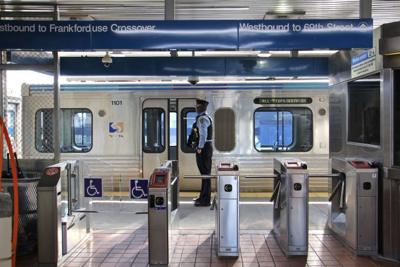
SEPTA has been awarded a $317.1 million grant to purchase 200 new cars for the Market-Frankford Line, federal legislators announced Thursday.
Social media posts from Sen. Bob Casey and John Fetterman and Congressman Dwight Evans shared the message.
The Market-Frankford Line is historically the single busiest route in the city, averaging around 180,000 riders daily in 2019. The current Market-Frankford Line cars were produced by Adtranz, an Italian company, and the M4 cars hit the tracks between 1996 and 1999.
The aging vehicles have come under increased scrutiny because of repairs that create delays or canceled trains during morning commutes, frustrating passengers.
“The current underperforming M4 fleet no longer provides the frequency or reliability our customers deserve, and replacing these cars is our highest priority,” said SEPTA CEO and General Manager Leslie S. Richards.
The new grant will surpass the over $200 million budgeted this fiscal year for “vehicle acquisition and overhauls” and allows SEPTA to replace nearly all of the M4 cars. According to the current capital budget proposal, SEPTA was planning to spend $950 million to replace the Market-Frankford Line vehicles through fiscal year 2031.
“A modern, well-run public transit system is vital to our city and region,” Philadelphia Mayor Cherelle Parker said in a statement Friday. “We’re grateful to our entire congressional delegation — and to the Biden-Harris administration — for this latest federal investment in Philadelphia.”
The car design was approved in 2022 and acquisition is supposed to begin in the next fiscal year. A spokesperson for SEPTA said a design and vendor will be announced later this spring or early summer, with the new cars in service in about five years.
“Included within the project’s budget is vehicle specification development, as well as signal system and other infrastructure improvements needed to enhance operational efficiency of the new railcars,” the section on replacing the cars says. “Modernization of the signal system on the Market-Frankford Line will improve operational reliability for the train control systems on the entire corridor.”
As much as SEPTA’s operation budget has suffered from a drop in ridership since the pandemic, the situation is more dire on the capital side. The budget proposal for the current fiscal year shows a $5.1 billion “state of good repair backlog,” with over $1.6 billion of that on vehicles. The overall capital budget includes almost $363 million in current federal funding.
“The aging M-4 trains on the Market-Frankford Line have reached the end of their lifespan, rendering them obsolete,” said Jay Arzu, a doctoral student in city and regional planning at the University of Pennsylvania’s Stuart Weitzman School of Design. He’s also an advocate for a Roosevelt Boulevard subway route. “The introduction of the state-of-the-art M-5 cars, equipped with cutting-edge train technology, will not only rejuvenate the system but also enable faster frequencies, enticing more riders to return.”
The federal grant comes at a key time for SEPTA, as the transit authority faces a $240 million deficit on the operating side from the end of COVID-related federal funding.
In his budget address, Gov. Josh Shapiro proposed $161 million in new state funding and called for the counties to provide additional resources in kind. The federal legislators in the area made a unified call for additional funding for SEPTA from the Department of Transportation in January.
“I am proud to have advocated for this critical funding and secured a record amount for southeastern Pennsylvania’s public transit infrastructure,” Fetterman said.
Evans said, “We’re working together to make sure that the Infrastructure and Jobs Act continues to deliver for Philadelphia and the region.”